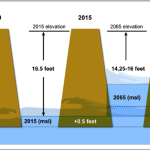- DETERRENCE: The Navy is preparing to launch swarm bots out of cannons
- DPRK: North Korea seeking foreign investors after deal with Chinese company
- GOVERNANCE AND CIVIL SOCIETY: Abe to include ‘apology’ in war anniversary statement
- CLIMATE CHANGE ADAPTATION: Tackling climate change and promoting sustainable development
- CLIMATE CHANGE AND SECURITY: It’s not climate change — it’s everything change
Deterrence: The Navy is preparing to launch swarm bots out of cannons, Patrick Tucker, Defense One (14 April 2015)
Services such as the Navy are developing rocket launchers that fire multiple small drones to swarm, monitor, and attack. Such drones will be more autonomous. Full or even partial autonomy creates new problems for command-and-control, laws of war, and the risk of inadvertent attack that results in immediate and uncontrollable escalation.
- Air Force wants UAV swarms, Michael Peck, C4ISR$Networks (11 June 2015)
- Relying on the kindness of machines? The security threat of artificial agents, Randy Eshelman and Douglas Derrick, Joint Forces Quarterly 77 (1 April 2015)
- Safety aspects of meaningful human control: Catastrophic accidents in complex systems, John Borrie, UNIDIR Weapons, Technology and Human Control Conference, New York (16 October 2014)
DPRK: North Korea seeking foreign investors after deal with Chinese company, Nathan Vanderklippe, The Globe and Mail (13 August 2015)
North Korea finds it nearly impossible to escape China’s economic grasp and finds cautious, tentative moves allow North Korean businesses some flexibility in attempting to pursue “parallel development” of economic lines and nuclear program lines. Although Pyongyang’s goals in laying landmines were mostly domestic, they are clearly consistent with a campaign approved much higher than the Korean People’s Army. In addition to the cross-border tensions raised, the mine laying will result in negative repercussions for an already distressed ecological zone in the DMZ.
- Korea’s trade with China tumbles this year: KDI, Yonhap News Agency (11 August 2015)
- Korea mulling reinstatement of tree burning policy at border, Hyun Bin, Arirang News (12 August 2015)
- North Korea using image of South Korean president in target practice, Elizabeth Shim, UPI (13 August 2015)
GOVERNANCE AND CIVIL SOCIETY: Abe to include ‘apology’ in war anniversary statement, Asahi Shimbun (11 August 2015)
As the 70th anniversary of the end of World War II approaches, Japan PM Abe is expected to include the word “apology” in a statement after pressure from a coalition partner. Legacies of the war are still strong in the region, with varying truths taught in histories presented by each nation and xenophobia still quite strong in Japan towards ethnic Koreans.
- Asia: History lessons feed rival nationalism, Tom Mitchell, Robin Harding and Simon Mundy, Financial Times (11 August 2015) * Subscription required
- A legacy of WWII, Korean residents test nation’s ability to accommodate non-Japanese, Eric Johnston, Japan Times (10 August 2015)
CLIMATE CHANGE ADAPTATION: Tackling climate change and promoting sustainable development: An action plan for Australia’s international engagement, Australian Council for International Development (July 2015) [1.07 MB, PDF]
Australia must take action on climate change if it has to play a fair and effective role in reducing poverty and inequality and promoting sustainable development. Moreover, strong international action on climate change is vital to the developing countries and poor communities that are being hardest hit by the impacts of climate change. These impacts are not a far off threat – they are already being felt through sea level rises, increased intensity of tropical cyclones, decreasing crop yields and water shortages. Action on climate change is squarely in Australia’s interests, as climate change poses threats to its own quality of life as well as to the prosperity and stability of the region.
- Resilience and sustainable development: Building adaptive capacity in a world of transformations, Carl Folke et al., Ambio, vol. 31, no. 5 (August 2002) [161 KB, PDF]
- Policy: Sustainable development goals for people and planet, David Griggs et al., Nature, vol. 495, pp. 305-307 (21 March 2013) *subscription required
 Climate Change and Security: It’s not climate change — it’s everything change, Margaret Attwood, Matter (27 July 2015)
Climate Change and Security: It’s not climate change — it’s everything change, Margaret Attwood, Matter (27 July 2015)
Attwood: ‘If we fail, we all fail together: we have “just one chance to get it right”.’
Marshall: ‘Climate-change denial is in fact highly politically astute, well-informed and strategic. Climate change challenges us at almost every level of our identity and forces us to rethink what we assume to be true.’
Robinson: ‘As the window to act gets smaller, the likelihood that this action will be hastily implemented increases and this, in turn, will increase the very real human rights risks associated with rapid mitigation action.’
Venezuela: ‘The threats to the small island states are the new forms of colonialism.’
- Why are we still waiting for a solution to climate change? Because it’s hard, George Marshall, New Statesman (30 July 2015)
- Venezuela to UN: ‘Climate change threatening the Caribbean’, telesurvtv.net (30 July 2015)
- Q&A with Mary Robinson: What is climate justice? Germana Canzi, Road to Paris (30 July 2015)
The Nautilus Peace and Security Weekly Report presents articles and full length reports each week in six categories: Austral security, nuclear deterrence, energy security, climate change and security, the DPRK, climate change adaptation and governance and civil society. Our team of contributors carefully select items that highlight the links between these themes and the three regions in which our offices are found — North America, Northeast Asia, and the Austral-Asia region.
Subscribe to NAPSNet to receive free weekly email reports.
- Editor: Arabella Imhoff
Contributors:
- Deterrence: Peter Hayes
- DPRK: Roger Cavazos
- Governance and Civil Society: Dyana Mardon
- Climate Change Adapation: Saleem Janjua
- Austral Peace and Security: Richard Tanter

